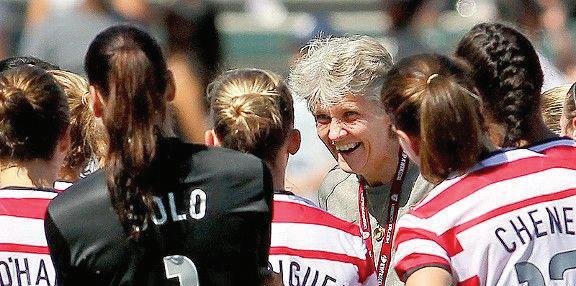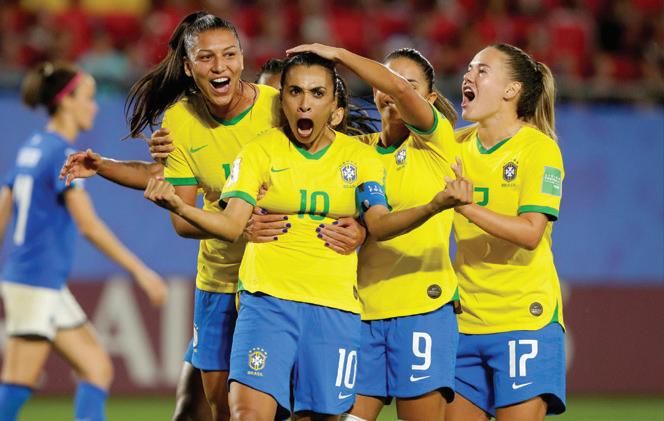
6 minute read
Sweden’s Champion of Women’ s Soccer
Pia Sundhage is one of Sweden’s best female soccer players of all times. As a coach, she has gone on to lead the United States women’s national team to two Olympic golds and the Swedish team to a silver. Now, she is trying to do the same for Brazil at the Olympic Games in Tokyo. By Kajsa Norman
When Pia grew up in the 1960s, there was no such thing as women’s soccer. “Soccer was a sport for men, something that girls shouldn’t even consider,” she recalls.
However, young Pia quicky discovered she enjoyed kicking the ball, and she was good at it. In her hometown of Marbäck outside Ulricehamn, she was considered an odd bird, but the boys still allowed her to play with them.
On the local soccer pitch, Pia pretended to play for Brazil, Sweden or West Germany (as it was called back then). Somedays she was Pelé, other days Beckenbauer.
One day, the coach of the local boys’ team came up to Pia and asked if she wanted to play a proper soccer match. Pia was thrilled, but the offer came with a caveat; she’d have to pretend to be a boy.
“He came up with the name Pelle instead of Pia, so for two years my name was Pelle and that allowed me to play soccer on the boys’ team,” she recalls.
In 1971, at age 11, Pia played her first match with a women’s soccer team, IFK Ulricehamn. By the age of 15, she was playing for the Swedish National Team.
In 1984, Sweden won the European Women’s Championship, or European Competition for Women's Football, as it was called back then. Pia scored the winning goal against England in the final. She also scored both goals in the semi-final against Italy, making such an impression on the Italians that S.S. Lazio offered her a contract. In 1985, at the age of 25, Pia became Sweden’s first female professional soccer player.
After a successful career where Pia participated in 146 matches with Team Sweden, scoring an incredible 71 goals, she transitioned to coaching. “After 22 years on the women’s national team it felt like a natural next step,” she says.
Pia began coaching Swedish teams in the 1990s before crossing the Atlantic in the early 2000s to coach women’s soccer teams the Philadelphia Charge and the Boston Breakers. In 2007, she served as an assistant coach for the Chinese women's national team during the FIFA Women's World Cup. That same year, she was offered the job as head coach of the United States women's national team.
“I screamed out loud,” she recalls. “Just imagine being given the opportunity to coach the best team in the world as they are heading to the Olympics, and I got to pick the path.”
Her first year as their coach, Pia World Coach of the Year in 2012.
That same year, Pia returned to Sweden where she became head coach of the Swedish women’s national soccer team, coaching them to bronze in the European Championships and a
Pia Sundhage was the head coach of the Swedish women’s national soccer team 2012-2017, coaching the team to success. Photo: TVsporten/SVT led the team to an Olympic gold at the 2008 Summer Olympics. Afterwards, all American Olympic gold medalists were invited to the White House to meet President George W Bush, but Pia turned down the invitation. “I’m simply not impressed by big men,” she explains. Pia also coached the American team to a silver in the 2011 FIFA Women's World Cup, where the US advanced to the final for the first time since 1999. And in the 2012 Summer Olympics, they won gold again. Pia’s success led to her being named FIFA Pia Sundhage is one of the most successful US managers. She reached a World Cup final and won two Olympic golds. Photo: ESPN.com

silver in the 2016 Olympics. In 2019, she took over as coach of the Brazilian women's national soccer team where she is currently on contract until 2024.
In an interview with the Swedish Women’s Educational Association (SWEA), Pia reflected on what she has learned from working in different cultures.
“As a leader you have to understand the people you’re leading. Americans are phenomenal at pushing themselves to the next level and wanting to be winners. With them you almost have to put on the brakes a little bit and encourage them to reflect on what they’re doing. It is not just about the results but also the performance. It’s important to be proud of the performance along the way.”
Swedes, she says, are more con-

The Brazilian team is going for gold in the Olympics. Photo: FIFA.com Pia Sundhage is working on fostering team spirit in the Brazilian team. Photo: FIFA.com
templative. With Swedish players it’s more about good organization and teamwork. And in Brazil, it’s all about emotions.
“When everybody has a great feeling and things are going well – then we are unstoppable. But when there’s a problem, Brazilian players tend to revel in their own emotions instead of relying on organizational skills, like the Swedes, or relying on grit, like the Americans. That’s when emotional soccer turns to bad soccer,” says Pia who tries to infuse the Brazilian National Team with Swedish organizational skills and American fighting spirit.
“I’m trying to create team spirit. Brazil has never won an Olympic gold or a World Cup. Something has to change to shift the focus away from the individual and onto the team.”
Throughout her lifetime, Pia has witnessed women’s soccer go through incredible changes. “Things have changed so much. There used to be so much resistance,” she says. “We’ve crushed lots of glass ceilings and prejudices during these years.”
While there have been breakthroughs, it has still been tough to attract attention for women’s league play between the big championships. But Pia is optimistic.
“We now have Swedish players like Caroline Seger and Magdalena Eriksson who are full-time professionals. There is still a ways to go, but the

development is very inspiring. I am so proud that the generation I belong to has led the way. I think everybody feels like we didn’t just fight for ourselves, but also for the next generation and the next. I feel incredibly fortunate to have been a part of this journey from back when people said girls don’t want to play soccer, shouldn’t play soccer, aren’t able to play soccer, to where we are today with World Championships, European Championships and Olympic Games. It’s an incredible journey which will continue in the years to come.” Pia Sundhage was born in 1960 and started to play soccer at a young age.
She played for:
Falköping KIK Jitex BK Östers IF S.S Lazio Stattena IF Hammarby IF
Pia’s Team Sweden Stats:
22 – Years played 146 – Matches played 71 – Goals
Fun fact:
In 1989 Sundhage scored the first goal ever in a women's match at Wembley Stadium, as Sweden beat England 2–0 in an opening act for the Rous Cup*.
Time Table for the Olympic Soccer Matches:
Olympic soccer Group matches begin on July 21. Teams are divided into three groups with the top two teams from each group advancing to the playoff round. Follow Pia´s Brazil or your National team. All times shown – local time in Japan.
Wednesday July 21st
5.00 pm CHN – BRA 5.30 pm USA – SWE 7.30 pm JPN – CAN
Saturday July 24th
4.30 pm CHL – CAN 5.30 pm SWE – AUS 8.00 pm NLD – BRA 8.30 pm NZL – USA
Tuesday July 27th
5.00 pm USA – AUS 5.00 pm NZL – SWE 8.00 pm CAN – GBR 8.30 pm BRA – ZMB
*a short-lived soccer competition in the 1980s.










